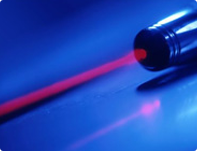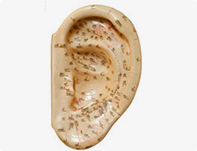How does AcuQuit® Laser work?
AcuQuit® uses cold laser light therapy combined with Acupuncture Quit Smoking points. The intention of our treatment is to reduce physical cravings to allow an individual to stop smoking.
Our treatment objectives are to reduce cravings, irritability and short-temper, stress and anxiety, release endorphins and promote general health and well being.
What happens during a treatment?
During our quit smoking treatment a low level laser (no more powerful than a lightbulb) is applied to points on the hands, legs and ears. The overall treatment time is 45-60 minutes. Some clients may feel the sensation from the low-level laser which is described as a warm, pulsating and sometimes tingling feeling. The Laser treatment itself is non-invasive, non-thermal and drug free.
How exactly does this treatment work?
There are several possible mechanisms in which Laser Acupuncture may be working in the quit smoking process.
1/ Stimulating the Central Nervous System
One of the most important mechanisms underlying acupuncture is its action on the central nervous system. Acupuncture interventions stimulate peripheral nerves to generate relevant effects in the central nervous system. Research suggests that stimulation of different points on the body causes distinct responses in hemodynamic, fMRI and central neural electrophysiological responses. [1]
2/ Endorphins and Neurotransmitters
Acupuncture stimulation causes the release of endorphins, serotonin, enkephalins, adenosine, γ-amino-butyric acid (GABA, a major inhibitory neurotransmitter of the brain) and dopamine. [2] Endorphins are endogenous opioids released from the pituitary gland in your body that signal your system to increase energy levels and decrease stress. Endorphins are believed to mediate analgesia, induce euphoria, and play a role in the reward system in the brain. It has been suggested that endorphins are responsible for creating the relaxed psychological state known as “runner’s high”. [3]
3/ Opioid Activity and Withdrawal
Research suggests that opioidergic activity plays a role in addictions by mediating the development of reinforcing qualities of certain activities and substances. [2]
In a classic paper, opioid peptides were released during the acute administration of acupuncture in association with relief of withdrawal symptoms in humans (Clement-Jones 1979 [8]).
Is there evidence that Laser treatment works?
There are many research articles available examining Acupuncture’s role in addiction and the potential for treatment to reduce and eliminate dependency.
Laser Acupuncture had an 84% success rate in recent research (Lim 2018) with many participants reporting they no longer had the urge to smoke. [11]
Laser acupoint stimulation does indeed modify the physical symptoms of withdrawal and makes it possible for motivated persons to succeed in overcoming habitual smoking of tobacco, concluded a double-blind, placebo-controlled randomized study. [12]
The most recent Cochrane Systematic Review (White 2014) states that the 2008 Kerr study on laser stimulation is strongly positive at both short and long-term outcomes. [13]
Earlier research had shown that Laser Acupuncture had a 71% success rate in heavy smoking patients. [14]
Based on the external research available, it appears that there are potential benefits to using Laser Acupuncture treatments and protocols. However, it’s important to note that the evidence may not be entirely conclusive, as some studies have had different results.
Different studies employ diverse variables for laser therapy such as laser power, laser frequency, point location and the quantity of sessions. Certain studies have also relied on self-reported data, particularly regarding participants’ smoking status at the conclusion of treatment. This is commonly known as end of treatment results. However, it is important to note that the reliability of these self-reports decrease when they are not confirmed through biochemical testing.
It should be noted that the AcuQuit treatment method is distinct and produces varying outcomes compared to the available research. Therefore, we advocate for patients to make educated and informed decisions, keeping in mind that while our treatment can offer potential benefits, successful outcomes cannot be guaranteed.
Multiple therapy approach
The AcuQuit system is unique and combines different therapies and techniques to achieve optimal outcomes.
Laser Acupuncture

We use low level laser to stimulate Acupuncture points on the body. This part of the treatment is designed to reduce the physical symptoms of nicotine addiction and withdrawal.
Auricular (Ear) Therapy

Auricular therapy involves the use of press pellets placed on Acupuncture points located on the inner surface of the ear. This Acupuncture micro-system can be stimulated with the focus on reducing cravings and reducing anxiety.
Lifestyle Advice and Education
Detoxification through Supplementation
Outcomes
The desired outcome of the treatment is for the client to leave the clinic and to not experience any cravings or withdrawal symptoms. If this reduction in physical symptoms can be achieved and sustained then the client should be able to quit smoking cigarettes for good.
How to quit smoking?
To book an appointment online please click here or simply call us on 1800228784
More Questions?
For more information about our treatment including pricing click here.
References
[1] Point specificity in acupuncture. Choi EM1, Jiang F, Longhurst JC. Chin Med. 2012 Feb 28;7:4. doi: 10.1186/1749-8546-7-4. Link
[2] An Historical Review and Perspective on the Impact of Acupuncture on U.S. Medicine and Society. Lu DP, Lu GP. Med Acupunct. 2013 Oct;25(5):311-316. Link
[3] Endorphins, Exercise, and Addictions: A Review of Exercise Dependence. Andrea Leuenberger. Journal: Impulse (The Premier Journal for Undergraduate Publications in the Neurosciences) Issue: 2006 Link
[4] Cheng RS, Pomeranz B, Yu G. Electroacupuncture treatment of narcotic-dependent mice reduces signs of withdrawal, without showing cross-tolerance. European Journal of Pharmacology 1980;68:477-81. Link
[5] Choy YM, Tso WW, Fung KP, Leung KC, Tsang YF, Lee CY, et al. Suppression of withdrawals and plasma ACTH by auricular electroacupuncture. Biochemical and Biophysical Research Communications 1978;82:305-9. Link
[6] Han JS, Zhang RL. Suppression of abstinence syndrome by body electroacupuncture of different frequencies in rats. Drug and Alcohol Dependence 1993;31:169-75. Link
[7] Ng LKY, Douthitt TC, Thoa NB, Albert CA. Modification of withdrawal syndrome in rats following transauricular stimulation: an experimental paradigm for auricular acupuncture. Biological Psychiatry 1975;10:575-80. Link
[8] Clement-Jones V, McLoughlin L, Lowry PJ, Besser GM, Rees LH, Wen HL. Acupuncture in heroin addicts: changes in met-enkephalin and beta-endorphin in blood and cerebrospinal fluid. Lancet 1979;2:380-3. Link
[9] Chae Y, Yang CH, Kwon YK, Kim MR, Pyun KH, Hahm DH. Acupuncture attenuates repeated nicotine-induced behavioral sensitization and c-Fos expression in the nucleus accumbens and striatum of the rat. Neuroscience Letters 2004;358(2):87-90. Link
[10] Effect of acupuncture on anxiety-like behavior during nicotine withdrawal and relevant mechanisms. Chae Y1, Yeom M, Han JH, Park HJ, Hahm DH, Shim I, Lee HS, Lee H. Neurosci Lett. 2008 Jan 10;430(2):98-102. Epub 2007 Oct 30. Link
[11] Painless Laser Acupuncture for Smoking Cessation. Rodney Choon Huat Lim. Med Acupunct. 2018 Jun 1; 30(3): 159–162. Link
[12] Low level laser for the stimulation of acupoints for smoking cessation: a double blind, placebo controlled randomised trial and semi structured interviews. Catherine M. Kerr, Paul B. Lowe & Neil I. Spielholz. Link
[13] White AR, Rampes H, Liu JP, Stead LF, Campbell J. Acupuncture and related interventions for smoking cessation. Cochrane Database Syst Rev. 2014(1):Cd000009. Link
[14] Laser-acupuncture reduces cigarette smoking: a preliminary report. Zalesskiy VN, Belousova IA, Frolov GV. Acupunct Electrother Res. 1983;8(3-4):297-302. Link



